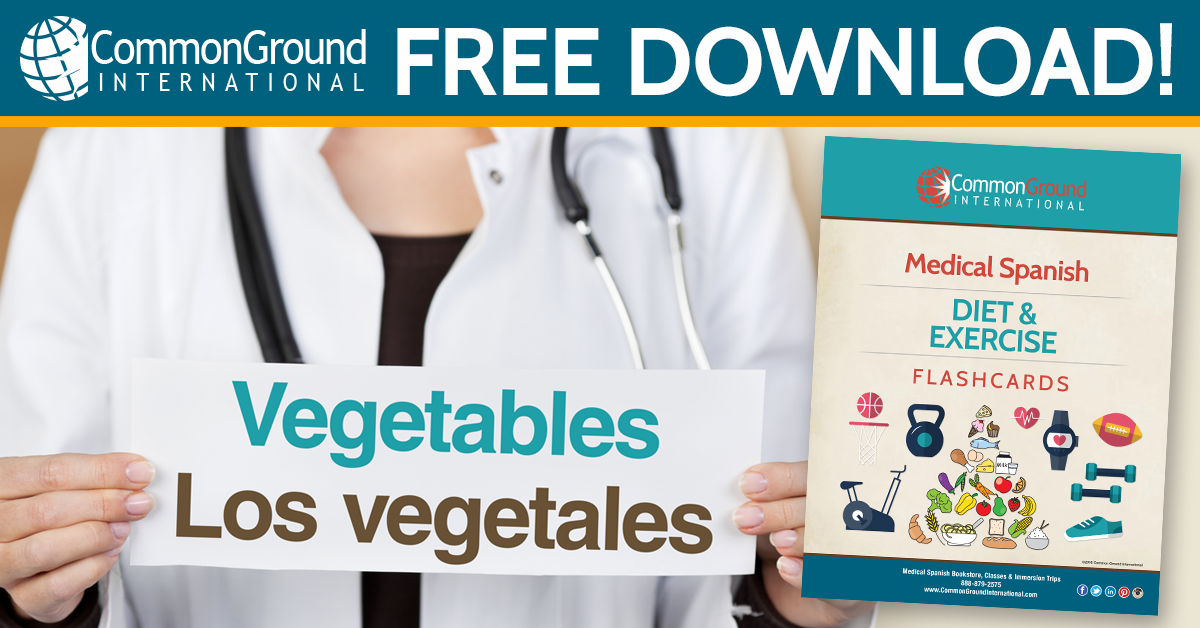Do you ever need to talk about diet and exercise in Spanish with patients? This vocabulary is perfect for diabetes education in Spanish or even general nutrition counseling with your patients.
The free diet and exercise in Spanish flashcards include the following terms in an easy-to-study print & cut format. Enjoy!
[grid]
[row]
[column five wide]
Exercise
- aeróbico
- el equilibrio
- los huesos
- las calambres
- días
- el ascensor
- la energía
- la elasticidad
- el gimnasio
- pulso
- horas
- minutos
- el parque
- la resistencia
- zapatos
- la acera
- la escalera
- fuerza
- el estrés
- estirarse
, el estiramiento
- agacharse
- bailar
- esforzarse
- cuidar el jardín
- trotar
- bajar
- mover
- jugar
[/column][column five wide]
- rastrillar (las hojas)
- alcanzar
- montar (en bicicleta)
- correr
- estirar
- nadar
- limpiar con aspiradora
- caminar
Diet and Nutrition
- las manzanas
- las bananas
- el brócoli
- la caloría
- las zanahorias
- el apio
- el queso
- los cheetos
- el pollo
- las papitas fritas
- las galletas
- el pescado
- la comida
, el alimento
- las frutas
- lleno
, satisfecho
- la granola
- las uvas
- las provisiones
- la lista del almacén
[/column][column five wide]
- el supermercado
- sano
, saludable
- alto en grasa
- alto en azúcar
- el jugo
- la comida basura
, comida chatarra
- ligero
- bajo en grasa
- la comida
- la carne
/la proteína
- leche
- los nueces
- las naranjas
- los pimientos
- la ración
, la porción
- la ensalada
- el sándwich
- las meriendas
- la soda
- atriborrado
- comprar
- cocinar
- beber
- comer
- preparar
- los vegetales
- el agua
- el yogur
[/column][/row][/grid]
Here are a few additional helpful phrases and words if you’re involved in diabetes education in Spanish; or if you regularly talk about diet and exercise with your patients:
- Avoid: evitar
- Blood pressure: presión sanguínea
- Breakfast: el desayuno
- Changes in vision: cambios en visión
- Cholesterol: colesterol
- Dinner: la cena
- Dizziness: mareo
- Fat (in foods): grasa
- Foods that are high in / low in: Comidas que son altas en / bajas en…
- Lunch: el almuerzo
- Once a day: una vez por día
- Per: por (ex. 30 minutes per day = treinta minutos por día)
- Three times a day: tres veces por día
- Twice a day: dos veces por día
Study diet and exercise vocabulary in Spanish with these flashcards
Cultural note regarding persuasive discussions around diet and exercise:
You might be tempted to talk about all the great health benefits for the individual patient when they are able to improve their diets and get on a regular exercise routine. Of course that stuff is important – HOWEVER – this may not be the most persuasive approach for your everyday Spanish speaker. If you’re speaking to an adult, they are probably less motivated by their own individual health improvements as they are motivated by what staying healthy means to their family and loved ones.
Motivational interviewing and patient centered approaches to diabetes management will get you there eventually, but you might just keep in mind that you may get better traction with your SSO patients when you talk about staying healthy so they can be there for their family instead of staying healthy so they feel great, lose weight, and look better.
Every month we publish a new lesson & giveaway – follow us on Facebook to always get the latest updates!
Keep up the good work speaking responsible Spanish to your patients! Check out our other books, classes & products to help you !
*If the link isn’t working for you, you may need to unblock pop-ups in your browser settings





Pingback: Explaining the 5 2 1 0 Diet in Spanish | Common Ground International Language Services